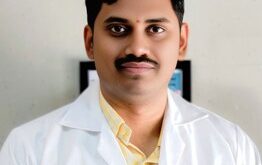Several innovations can reduce toxicity while enhancing, or at least preserving, the efficacy of treatment
BENGALURU / February 5, 2024: Cancer is a dreaded disease because without therapy, it is uniformly fatal, and its therapy is almost always toxic. Along with the fear of death, patients are also afraid of toxicity in cancer treatment and reduced quality of life. However, the good news is that several innovations can reduce toxicity while enhancing, or at least preserving, the efficacy of treatment. This was said by Dr. Radheshyam Naik, Consultant Medical Oncologist and Hematologist and Bone Marrow Transplant Physician with Sammprada Hospital, Bengaluru, in the run-up to World Cancer Day.
Said Dr. Radheshyam Naik: “At least 70% of all cancers are preventable, while majority of the remaining 30% can be detected early by regular screening. When cancer is detected early the treatment can be simple, non-toxic, and largely curative. But cancer is mostly detected in advanced stages in India when treatment has to be multi-faceted, toxic and often life prolonging but not curative. In my own practice of three decades, I have learnt many lessons in treating cancer and innovated constantly to reduce toxicity while enhancing or at least preserving the efficacy of treatment. These lessons can be hugely beneficial to the medical fraternity in treating cancer patients.”
He added: “One of these innovations is the dose-dense chemotherapy in which, instead of once in three weeks, chemotherapy is split into smaller portions and given every week. I have found after hundreds of patients that this method reduces most of the toxicities, including the dreaded bone marrow toxicity, thereby improving the quality of life. Actually, more quantity of drugs can be given this way compared to the three-weekly treatment plan, and many times the efficacy is also higher. We have also published a study where weekly treatments do much better than three-weekly therapies. In very old and sick cancer patients, low-dose daily oral treatment can be tolerated well and often produces dramatic effects with minimal toxicity.”
Dr. Radheshyam Naik said that using chemotherapy with anti-angiogenic treatments improves efficacy by increasing concentration of drug in the tumor but decreasing it in normal tissues, thereby shrinking the cancer and reducing the adverse events. “In addition to this, combination of chemo immune therapy, anti-angiogenic therapy have given remarkable results in some of the resistant treatment refractory cancer patients. We believe that judicious use of these combinations can help a lot more patients,” he said.
Based on his long experience of treating cancer, Dr. Radheshyam Naik said that to improve quality of life of patients, doctors need to liberally use IV albumin growth factors and vaccines to reduce infections, fatigue and low counts. “To avoid repeated vein punctures, we advise most of our patients undergoing chemotherapy to have long-term venous catheters or ports. Aggressive treatment of comorbidities, good elicitation of symptoms and symptom control can add efficacy and better quality of life to cancer patients,” he said.
The doctor said that further individualization of treatment is possible with genomic analysis. “By using next-generation sequencing, unnecessary use of ineffective therapy can be avoided and effective therapy can be given upfront. This not only avoids toxicity but also drastically reduces the cost of treatment for patients,” he added.
 Newspatrolling.com News cum Content Syndication Portal Online
Newspatrolling.com News cum Content Syndication Portal Online







